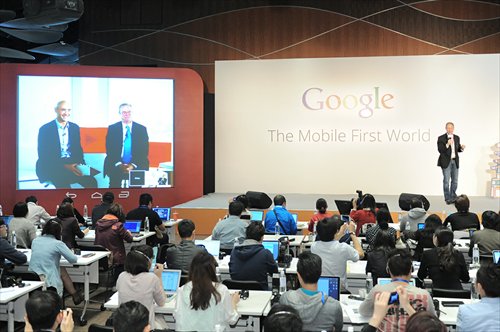Asia online
Google looks east for latest trends

Eric Schmidt (right, on the screen), Google's executive chairman, appears via video call at Google's press event in Taipei on Tuesday. Photo: Courtesy of Google
Technology trends often originate in the West and then spread to the East, but in terms of mobile Internet development, Asia is now ahead of Western countries, according to Google Inc.
At its annual press event held on Tuesday in Taipei, Taiwan - titled "Asia: The Mobile-First World" - Google said that Asia leads current mobile trends and will continue to do so.
More penetration
Google's Executive Chairman Eric Schmidt, who was in Japan promoting his new book How Google Works, made a surprise appearance via a video call at the press event on Tuesday.
"We are going from a Web-first world to a mobile-first world," and with its large population, Asia will be the mobile leader for a long time, said Schmidt.
The middle class in developing countries and regions are eager to buy smartphones, Schmidt noted, and as they are becoming less expensive more people will have access to them.
In September, Google launched an initiative in India called Android One, under which it is cooperating with three local Indian mobile phone companies to make smartphones that retail for about $100.
In the past year, 673.7 million smartphones shipped in Asia-Pacific, much higher than the shipment of 283.3 million in the Americas, according to data from US-based market research firm Canalys.
There is also a higher penetration rate for smartphones in Asian markets than in Western countries.
According to data Google released on Tuesday, smartphone penetration in the Chinese mainland, South Korea and Singapore is 70 percent, 80 percent and 85 percent, respectively, compared with 68 percent in the UK and 57 percent in the US.
Mobile only
When asked to predict trends in the next five years in developing countries, Schmidt said the next transition will be "from mobile first to mobile only."
More of the people who are going online for the first time live in Asia than anywhere else, and in many Asian markets mobile devices are the only means of getting connected to the Internet that users have, Chris Yerga, asia-pacific engineering director at Google, said at the press event.
With its high level of smartphone penetration, there is a growing number of people in Asia who do not see the need for a PC at all, unlike users in Western countries, he noted, adding that a smartphone gap is widening between Asia and the West.
The number of people using smartphones in Hong Kong is 13 percentage points higher than the number of people using PCs, while in the US 15 percentage points less use smartphones, according to data from Google.
In India, 85 percent of Internet users going online for the first time do so via a mobile phone, Google's data showed.
Asia has led many recent mobile trends, such as the passion for large-size smartphones and for taking "selfies." Now, Asia is also showing strong interest in content consumption via smartphones.
Asia has some of the highest rates of video-watching on smartphones in the world. For instance, 82 percent of smartphone owners in the Chinese mainland watch videos on their devices, while the numbers in the UK and Germany are only 61 percent and 53 percent, respectively, Yerga said.
Asian people's preference for smartphones has also created and sustained new markets, such as mobile games.
In Japan, 19 out of the 20 top-grossing apps on Google Play are games and Google Play Games has gained 100 million new users in the past six months, according to Yerga.
Google gets revenue from sales of apps and subscriptions through Google Play, an online store for Android devices, and Android devices had an 84 percent share of global smartphone shipments in the third quarter, The Wall Street Journal reported on Tuesday.
However, smartphone makers such as Samsung Electronics Co are distributing more of their own services on their Android devices in order to be more independent from Google, the report said.
Still keen on China
Schmidt said that there are more people in China using smartphones with Google's Android operating system than there are using Apple Inc's iPhone, but he did not mention any plans to change Google's current situation in the Chinese mainland.
Google's services are somewhat restricted in China, and have been less popular in the Chinese mainland since the company moved its servers to Hong Kong in 2010.
Currently, Google's main business in the Chinese mainland is helping domestic enterprises promote their business overseas with online advertisements.
"Google is committed to China," Richards Gilbert, head of Google Performance Solutions for China and Korea, said in an interview with Chinese reporters at the press event on Tuesday, adding that the company is investing in its office, employees and products in China.
"Any products that are appropriate to be released in China will be released, but at this point we are really focusing on display ads," he said.
Facebook Inc, which is also not accessible in the Chinese mainland, has adopted a similar strategy of selling online ads, but with more high-profile media exposure, particularly following CEO Mark Zuckerberg's visit to China in October.
As well as Google, leading Chinese search company Baidu.com Inc said it sees mobile Internet as its "No.1 priority," according to an e-mail Baidu sent to the Global Times on Wednesday.
Some of Baidu's mobile products have users in other Asia-Pacific countries, but advertising and monetization are still at a very early stage, the company said.
Companies with access to rich data resources, such as Google, Facebook and Baidu, can help advertisers to target potential consumers more effectively, an employee surnamed Wu at a Shanghai-based online advertising firm told the Global Times on Sunday.